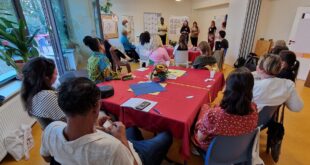The International Organisation for Migration (IOM), an agency of the UN, has opened a centre in Benin City to provide information on how to migrate legally and rehabilitate returnees from Libya or Europe.
Speaking at the opening of the Migration Resource Centre (MRC) on Monday, Minister of Labour and Employment, Dr Chris Ngige, said Nigeria was finding it tough to tackle migration issues. He however assured that the government would continue to make efforts to address the problem.
At least, 7000 Nigerians who migrated irregularly have been assisted to return home from Libya in the past one year.
“For the government of Nigeria, managing migration represents a growing challenge as Nigeria occupies an important position in the migration landscape in Africa,” he said.
While noting that government recognised the need for better management of organised labour migration following its importance to economic and social development of the country, he said the government had designed a policy to address the problem.
Speaking on the new MRC in Benin City, the minister said it would help to provide accurate information on regular migration procedures and documentation requirements.
On her part, the Chief of Mission of IOM in Nigeria, Ms Enira Krdzalic, said the establishment of MRC in Benin was strategic because of the high flow of migrants from Edo State.
She lamented that irregular migration along the Central Mediterranean route was getting increasingly dangerous for migrants.
“Over 70 per cent of the migrants interviewed by IOM on their arrival in Italy reported that they were victims of trafficking or other exploitative practices during their migratory journey,” she said.
The IOM chief said the MRC in Benin in addition to those in Abuja and Lagos would help to improve the knowledge of migrants about their destination countries.
“MRCs can also provide irregular migrants [in Europe or the transit countries] with information and advice about available services on voluntary return and reintegration,” she added.
The MRC provides assistance in the form of economic empowering initiatives for youths who are susceptible to irregular migration as well as reintegration assistance for returning Nigerians.
Kola Tella
 THE AFRICAN COURIER. Reporting Africa and its Diaspora! The African Courier is an international magazine published in Germany to report on Africa and the Diaspora African experience. The first issue of the bimonthly magazine appeared on the newsstands on 15 February 1998. The African Courier is a communication forum for European-African political, economic and cultural exchanges, and a voice for Africa in Europe.
THE AFRICAN COURIER. Reporting Africa and its Diaspora! The African Courier is an international magazine published in Germany to report on Africa and the Diaspora African experience. The first issue of the bimonthly magazine appeared on the newsstands on 15 February 1998. The African Courier is a communication forum for European-African political, economic and cultural exchanges, and a voice for Africa in Europe.




























